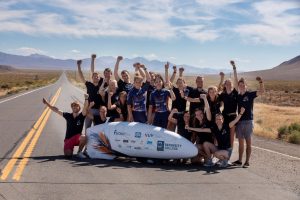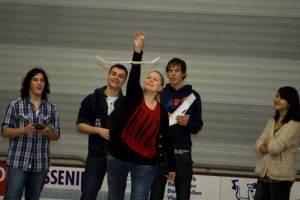September 15, 2018 TU Delft was thrilled by the success of the Human Power Team. This student team won the world speed challenge for women for cycling in the Nevada desert with a speed of 120 km/h. Two weeks later, September 29, the NUNA Solar Racing Team won the Sasol Solar Challenge in South Africa. They had been able to drive 4030.4 traveled kilometres in eight days.
They are two in a long row of successes of the D:DREAM student team projects (Delft: Dream Realisation of Extremely Advanced Machines). Winning the Solar Challenge in Australia seven out of nine races. Completing the world’s first full race with a fuel-cell powered racing car in a competition with conventional racing cars. Winning the second place in SpaceX Hyperloop Competion. And many more.

The winning Human Power Team with their Velox8 (Photo courtesy of Bart de Meijer)
It is therefore no surprise that the TU Delft Vision on Education 2018-2024, as discussed in another blog, reads that the university would like to create vibrant learning environments where students are challenged in a way that is comparable to, and inspired by, the same way they get inspired by taking part in a Dream Team.
What is it that creates such vibrant learning environment that makes the real difference?
Is it the interest in the hard-core engineering knowledge?
Young engineering graduates will be better off when they have an excellent mastery of the fundamentals of engineering sciences in combination, also in future scenarios that are full of uncertainty. Listening to all the noise we might easily get the impression that engineering is shifting more and more towards skills, and deep working knowledge in engineering sciences is getting less important. The reverse is true. A deep working knowledge is key in understanding the value and assessing the reliability and usability of the exponentially growing amount of information and data in our world.
“Knowledge is not only the subject matter we think about,
it also enables us to think”
Creative solutions for technological and societal problems cannot emerge from a vacuum. They need a broad and ready availability amount of engineering domain knowledge. The more somebody knows about subject matter in his or her engineering domain, the complexer the task he or she can handle and the more they can learn. Obviously knowledge of the fundamentals of engineering sciences is also a prerequisite for lifelong learning.
But knowledge alone is not sufficient for a successful career. This is particularly true when engineering professionals will increasingly collaborate with intelligent machines that do most of the lifting of information.
Is it the mastery of “21st century skills”?
“21st Century skills” sounds to me as a hollow phrase. Googling nowadays “21st century skills” yields 140 million hits. Thousands of web pages describe these skills in many different subdivisions, categories and flavours. But most of these skills must already have been important since ages! Our ancestors must have had excellent 21st century skills when they designed and built Stonehenge 3100 BC, the Colosseum 70-80 AD, or dried the Beemster Polder in the Netherlands in 1612 with windmills.
But it is true that a limited set of skills are gaining prominence. The ones that come to my mind are the ones that make us unique as human beings, and cannot (yet) be easily programmed in intelligent avatars or empathetic robotic assistants. Modern engineering studies should put more weight on interdisciplinary thinking, systems thinking, innovation skills and entrepreneurial behaviour. Teaching them detached from the engineering domain cannot work.
The real difference
When you ask me “What makes the real difference in being successful?”, my answer is neither the rigour of engineering knowledge nor the mastery of 21st century skills. The difference is the mindset of the students and staff. In Delft this is the spirit of getting things done. It is also the awareness that a difference between getting things done for 99% or for 100% is not a 1% but 100 %: the 1% is the difference between failure and success.
This getting-things-done spirit is strongly connected to a mindset of passion and perseverance, spearheaded by Angela Duckworth in her book “Grit”. It is all about courage, managing the fear of failure, conscientiousness, commitment to go for the gold rather than just show up for practice. It is about endurance, setting (personal) long-term goals, resilience, creativity. Grit is also about excellence, not about perfection. It reminds me of the engineering work in my former life in spaceflight industries, conceiving and designing extremely complex machines that perform under extreme conditions. In these projects of hard work, passion and perseverance, our mindset was “If you want to sink a project, it is aiming for the best”.
It is grit that sets the Delft student and study culture apart. My previous blog reads that longitudinal research in psychology has shown that success in an engineering career depends for 60-70% on passion and perseverance. And so it does in an engineering study.
Mindsets differ from attitudes. A mindset is a perception, a way of thinking, whereas an attitude is the outcome of the mindset: attitude is the behaviour of an individual towards a particular object, depending upon his or her mindset.
Fostering mindsets in engineering education
So a significant fraction of success in studies and future careers can be attributed to higher order mental skills, mindsets and ways of thinking and beliefs about the world. All-round engineers with these cognitive abilities can only be produced by educational programmes that are enriched to develop breadth, both on a professional and a personal level.
That is why we foster them so much in the Delft study programmes, on-campus as well as off-campus and in the student community. The spirit of engineering cannot be learnt through academic life alone. It is the world itself that is the most effective teacher for knowledge, skills and mindsets. That’s why we have integrated real-world and academic experiences wherever we can in our curricula.
The real world as the most effective teacher.
What can we do to move on from endless debating the embedding of skills and mindsets in engineering courses and programmes? In dozens of keynotes, podium and poster presentations I have seen excellent examples how front runner universities in the US, Western Europe, Australia, Singapore and Latin America are strengthening the learning of these attributes in their education, not as bolt-on activities or additional courses, but well integrated in the acquisition of the fundamental engineering knowledge.
In my example of the TU Delft Bachelor in Aerospace Engineering we don’t start our studies with a death march of maths and physics, but with a substantial course that introduces the freshmen into the foundations of aeronautical and spaceflight engineering to make the students passionate about aeronautics, aviation and spaceflight. In the first months already we let the students conceive, design, build and operate a flying wing, in line with the integrated CDIO approach. In the first and second years of study they experiment in windtunnels and material labs and analyse and argument the results. Research labs and makerspaces (see a previous blog) play a crucial role. It’s where students learn to engineer and innovate, learn the difference between failure and success, and develop passion for the subject.

Passionate first-year students operating their flying wing (photo TU Delft Aerospace Engineering)
We keep challenging the students. In a series of six design projects students learn to design, build, model, simulate, test, operate products and systems. Where they work with growing autonomy and increasing complexity, in intercultural teams so that they learn that engineering is a very social activity indeed, and that they learn what they are like. It is questionable to me if the design projects could not do better in developing courage, conscientiousness, a strong commitment to go for the gold, resilience and creativity, and mitigating the fear of failure. To achieve these goals, the projects, the much-esteemed capstone project in particular, should not only be academically interesting but more impact-focused and relevant for industry and society.
In that sense we do better in motivating many aerospace students to study a semester abroad somewhere in Europe, the US, Australia or more exotic places. They all take a three- to four-month internship at a company anywhere in the world, at Airbus, Boeing, Shell, Rolls Royce, Unilever, etcetera. And we offer the opportunity to our Master students to co-create 10-week fulltime interdisciplinary projects together with industrial and research partners and agencies, about windfarms, coastal defense protection, electric flight, smart manufacturing, innovative airports or geothermal energy (see blog about joint interdisciplinary projects). It is these learning environments that spark the development of grit in the minds of the students most.
Get the heck outside
It is not so much about knowing what to do. The barrier in education innovation is how to do it, and to make it happen. There is little need to invent it all by yourself. Share your questions and experiences, leave your bubble, and take a look at the outside world. It’s never urgent but always important.
“There are no facts inside the building, so get the heck outside!”
Spin-off
Experience shows that the integrated learning experiences that involve industries, agencies and authorities in the real world, have very rich outcomes for students, staff and organisation. The students develop into the best ambassadors for the department and Faculty, and provide a network for the faculty that often leads to long-term contacts for research with international universities and companies.



